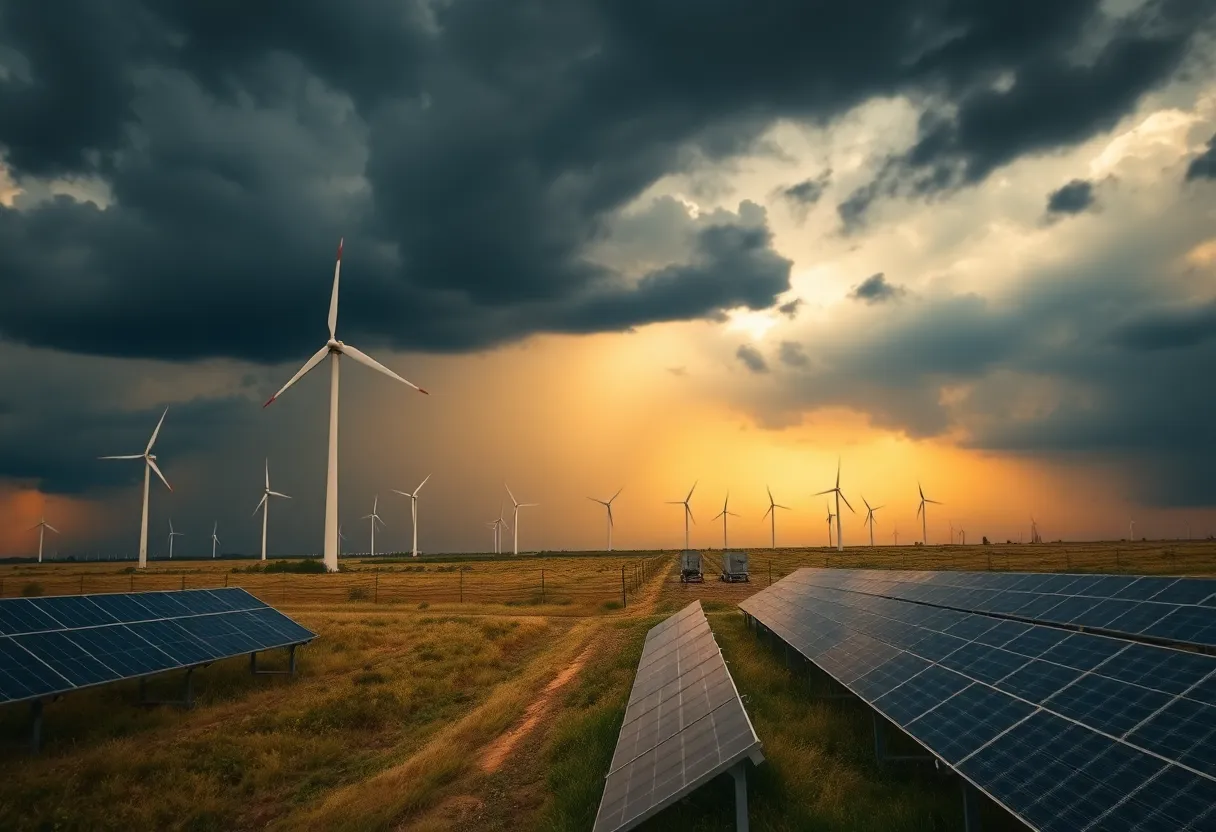

Stormy Texas Landscape with Renewable Energy
Texas lawmakers are debating two bills, House Bill 3356 and Senate Bill 715, which propose backup energy requirements for wind and solar farms. Industry leaders warn that these changes could lead to outages, deter investments, and increase electricity costs. The legislation aims to create a level playing field for energy sources but raises concerns over its impact on the renewable energy sector and the state’s electricity grid. As the debate unfolds, the future of Texas’s energy landscape hangs in the balance.
Texas is experiencing a pivotal moment as state Republicans advance legislation that could dramatically affect the renewable energy sector. Two bills, House Bill 3356 and Senate Bill 715, are currently being debated in the Texas legislature. The proposed legislation mandates that solar and wind farms must back up their electricity output with power from natural gas plants or battery storage systems. The ramifications of these bills have raised concerns among industry leaders, who warn they could impose significant operational hurdles for renewable energy projects in the state.
The legislation stipulates that if existing renewable energy projects do not have adequate backup power, operators risk incurring hefty fines or being compelled to cease operations. This regulatory framework has sparked critical discussions about its feasibility, with industry representatives cautioning that such requirements may not only be financially burdensome but may also force the closure of thousands of megawatts of renewable capacity already in operation. If adopted, this shift in policy could deter future investment in renewable projects, inviting companies to allocate their resources to more favorable regulatory environments outside of Texas.
The energy landscape in Texas is further complicated by a rising demand for electricity, prompting worries that a reduction in renewable energy supply could lead to a heightened potential for rotating outages. Experts in energy consulting have voiced alarm that the bills could undermine the reliability of the state’s electricity grid, potentially resulting in soaring electricity costs for consumers and businesses alike.
State Representative Jared Patterson, the author of House Bill 3356, has argued that the legislation aims to establish a ‘level playing field’ that could counteract perceived subsidies in the renewable sector. In contrast, proponents of renewable energy assert that natural gas power plants would not face the same rigorous requirements for backup power, thus maintaining a competitive advantage that could skew the energy market in favor of fossil fuels.
The implications of these changes are particularly concerning for manufacturers and industries that depend on consistent electricity pricing. There is apprehension that an increase in electricity rates could threaten manufacturing jobs and disrupt operations across the state. Recent analyses have indicated that as much as 15% of Texas’s existing wind energy capacity may be rendered unviable under the new regulations, leading to significant consequences for the state’s energy portfolio.
Supporters of the legislation claim it addresses the hidden costs tied to renewable energy, which they argue can affect other power producers, specifically natural gas and coal-fired plants. However, critics maintain that this perspective reflects a significant misunderstanding of how different energy sources can work together to ensure a stable grid. The CEO of the Electric Reliability Council of Texas (ERCOT) has highlighted the importance of maintaining a diversified energy mix to manage unprecedented growth in electricity consumption effectively.
The ongoing debate surrounding these legislative measures comes at a critical juncture for Texas, as lawmakers are confronted with the dual challenge of meeting energy demands while balancing the interests of both traditional fossil fuel and renewable energy sectors. As the 2023 legislative session progresses, the outcome of these bills could play a defining role in shaping the future of renewable energy in Texas, especially as the state prepares for another legislative session that will not convene until 2027.
The situation remains fluid as stakeholders and policymakers weigh the potential impacts on the energy market, consumer pricing, and the overall reliability of the state’s electrical infrastructure.
News Summary Local businesses in Texas are facing significant uncertainty as a federal trade court…
News Summary The Texas A&M System Board of Regents held a significant meeting with new…
News Summary Small business owners in Bedford, Texas, are grappling with the effects of ongoing…
News Summary During the Memorial Day weekend, Texas Game Wardens carried out multiple rescues due…
News Summary Leander Independent School District is confronting a significant budget deficit of over $19…
News Summary Dr. Weaver, a dedicated veterinarian from Leander, Texas, has been awarded CBS Austin's…